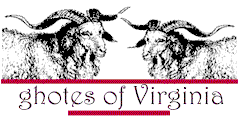
Tobacco Money
A Short Description from Barbara Cox
 |
Tobacco Money A Short Description from Barbara Cox
|
Why did the colonists use tobacco to settle accounts? Why not precious metals or coins?
English policy did not permit exportation of precious metals ... which limited coin circulation greatly.
This had various implications for trade. Planters received cash for tobacco only after it was sold in England. The English importer gave the planter credit so he could buy goods from the importer.
Tobacco was also used to pay fines and levies.
A Virginia planter would float his tobacco hogsheads/casks, which averaged about 1,000 pounds, to an inspection warehouse (regulated by the Burgesses). It was inspected and stored until an English ship came to pick it up. The planter received a receipt, and that receipt worked as a letter of credit.
The dollar became uniform money when the Constitution of 1787 was ratified, and tobacco was no longer money.
Read more colonial tobacco history at tobacco.org. Click here.
Also at the Mariners' Museum site. Click here.
Web site copyright 1996-2005 by Barbara Cox. Page updated April 16, 2005 (bc)